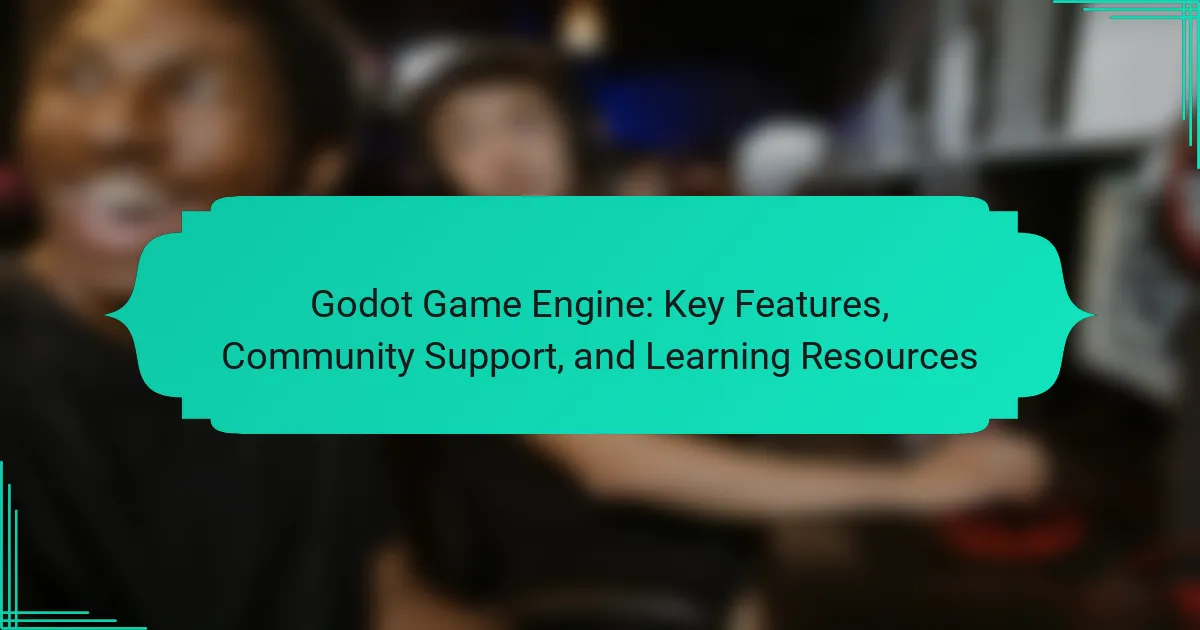Godot Game Engine enhances game development with its versatile features and community support. It offers a flexible scene system, a user-friendly scripting language, and seamless multi-platform exports. The active community fosters collaboration through forums and Discord channels, while extensive learning resources like documentation and online courses aid users in mastering the engine. These aspects make Godot a compelling choice for both new and experienced game developers.
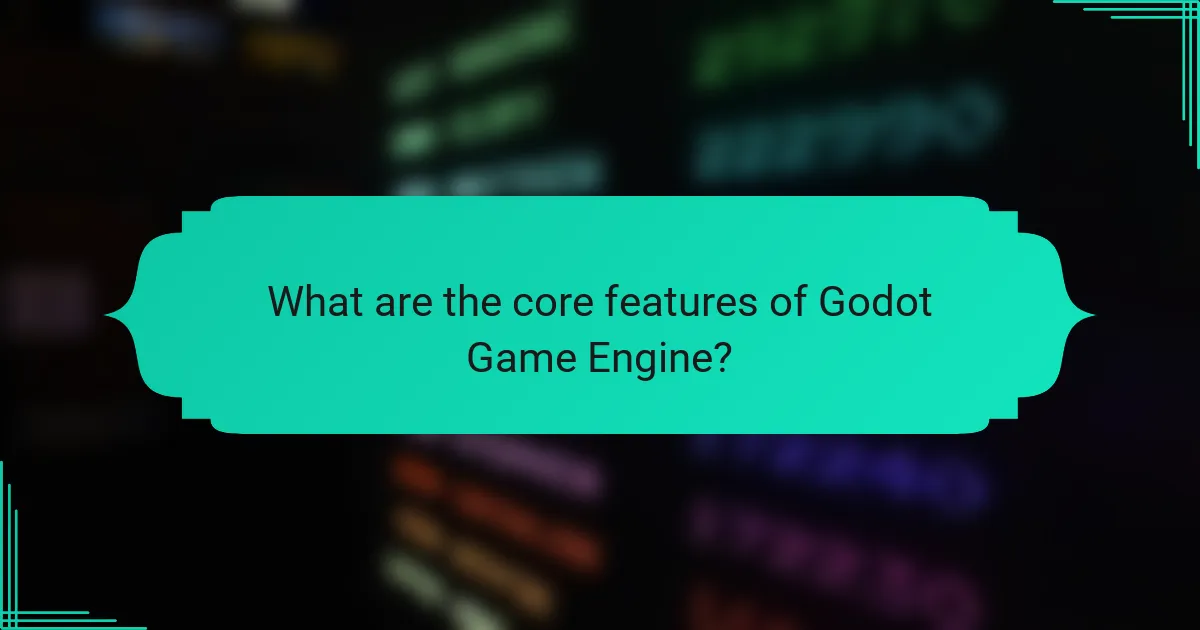
What are the core features of Godot Game Engine?
Godot Game Engine offers a range of core features that enhance game development. These include a flexible scene system, a built-in scripting language called GDScript, and support for both 2D and 3D game development.
The engine is open-source, allowing for community contributions and extensive customization. Godot provides a user-friendly interface and a comprehensive set of learning resources, including documentation and tutorials.
Notably, Godot’s unique attribute is its ability to export games to multiple platforms with minimal effort. Additionally, the engine’s active community support fosters collaboration and knowledge sharing among developers.
How does Godot’s scene system enhance game development?
Godot’s scene system streamlines game development by promoting modularity and reusability. Each scene acts as a self-contained unit, allowing developers to create complex hierarchies easily. This enhances collaboration, as multiple team members can work on different scenes simultaneously. Additionally, the system supports instancing, enabling developers to reuse scenes as components, which saves time and resources. The flexibility of Godot’s scene system fosters creativity and accelerates the development process.
What scripting languages are supported by Godot?
Godot supports several scripting languages, including GDScript, C#, and VisualScript. GDScript is the primary language designed specifically for Godot, offering ease of use and integration. C# provides a more robust option for developers familiar with the .NET framework. VisualScript allows for node-based programming, catering to those who prefer a visual approach.
Which platforms can games built with Godot target?
Games built with Godot can target multiple platforms, including Windows, macOS, Linux, Android, iOS, HTML5, and consoles like PlayStation and Xbox. This versatility allows developers to reach a wide audience across various devices. Godot’s support for multiple platforms enhances its appeal for game developers seeking broad distribution options.
What are the graphical capabilities of Godot?
Godot offers advanced graphical capabilities, including 2D and 3D rendering, customizable shaders, and built-in visual scripting. Its support for multiple rendering backends enhances performance across platforms. Key features include a node-based scene system and support for high-level visual effects. Additionally, Godot’s lightweight architecture allows for quick iteration in game development.
How does Godot support 2D and 3D game development differently?
Godot supports 2D and 3D game development with distinct tools and workflows. In 2D, Godot offers a dedicated scene system, optimized rendering, and built-in physics tailored for 2D gameplay. In contrast, 3D development utilizes a comprehensive set of features like 3D physics, lighting, and shaders, enabling more complex environments and interactions. The engine’s flexibility allows developers to switch between 2D and 3D seamlessly, enhancing creativity and efficiency.
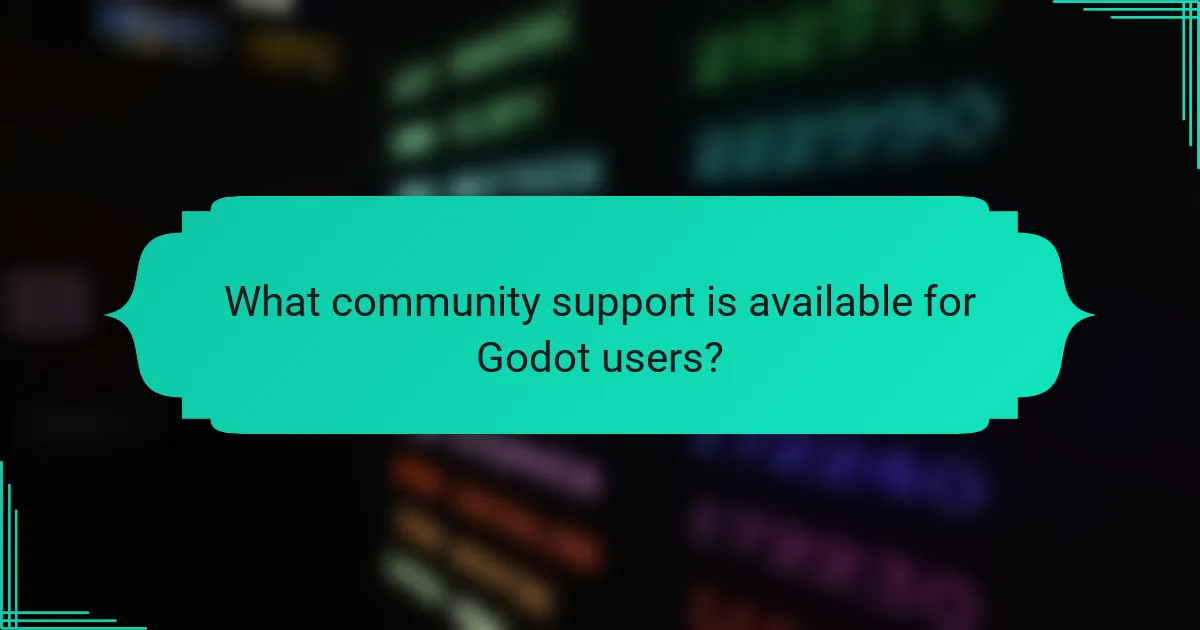
What community support is available for Godot users?
Godot users can access various community support options, including forums, Discord channels, and documentation. The official Godot community forum allows users to ask questions and share knowledge. Discord channels provide real-time assistance and collaboration opportunities. Additionally, comprehensive documentation and tutorials are available to help users learn and troubleshoot effectively. These resources foster a supportive environment for both new and experienced users, enhancing their game development experience.
Where can developers find forums and discussion groups for Godot?
Developers can find forums and discussion groups for Godot on platforms like Reddit, Discord, and the official Godot community website. These spaces foster collaboration and knowledge sharing among users. Popular forums include the Godot Engine Q&A site and the Godot subreddit. Additionally, Discord servers dedicated to Godot provide real-time communication and support for developers at all levels.
How can users contribute to the Godot project?
Users can contribute to the Godot project by participating in development, providing feedback, creating tutorials, and promoting the engine. Contributions strengthen community support and enhance learning resources. Developers can submit code, report bugs, or suggest features. Non-developers can help by translating documentation or creating assets. Engaging in forums and sharing experiences also fosters collaboration. These contributions enrich the Godot ecosystem and support its growth.
What role do local meetups and events play in the Godot community?
Local meetups and events play a crucial role in fostering collaboration and knowledge-sharing within the Godot community. They provide opportunities for developers to connect, share experiences, and learn from each other. These gatherings often feature workshops, talks, and game jams that enhance skills and creativity. Additionally, they strengthen community bonds, making it easier for newcomers to integrate and find support. Local events also promote the visibility of Godot, encouraging more developers to explore its capabilities.
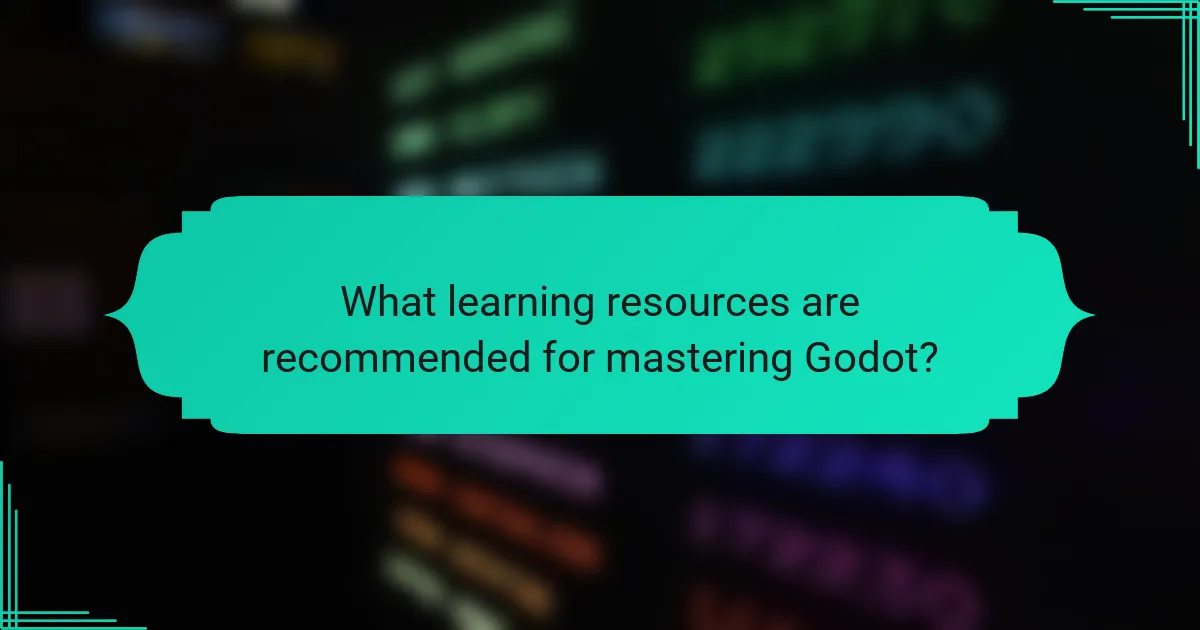
What learning resources are recommended for mastering Godot?
To master Godot, recommended learning resources include official documentation, online courses, tutorials, and community forums. The official documentation provides comprehensive guidance on features and usage. Online platforms like Udemy and Coursera offer structured courses. YouTube hosts numerous tutorials, catering to various skill levels. Engaging in community forums like Reddit and the Godot Q&A can enhance learning through shared experiences and solutions.
Which online courses are highly rated for Godot training?
Highly rated online courses for Godot training include Udemy’s “Godot 3: Complete Developer Course,” Coursera’s “Game Design and Development with Godot,” and Zenva’s “Complete Godot Game Development.” These courses offer comprehensive lessons on game development, community support, and practical projects.
What documentation is available for new users of Godot?
New users of Godot can access a variety of documentation to aid their learning. Key resources include the official documentation website, which offers comprehensive guides, tutorials, and API references. Additionally, the community forums and Q&A sections provide support and shared experiences from other users. Video tutorials and courses on platforms like YouTube further enhance the learning experience, catering to different learning styles.
How do tutorials and community-created content enhance learning?
Tutorials and community-created content significantly enhance learning by providing practical examples and diverse perspectives. They facilitate hands-on experience with the Godot Game Engine, enabling users to apply concepts in real projects. Community support fosters collaboration, allowing learners to share challenges and solutions, which deepens understanding. Additionally, user-generated resources often address specific needs not covered in official documentation, making learning more accessible and tailored.
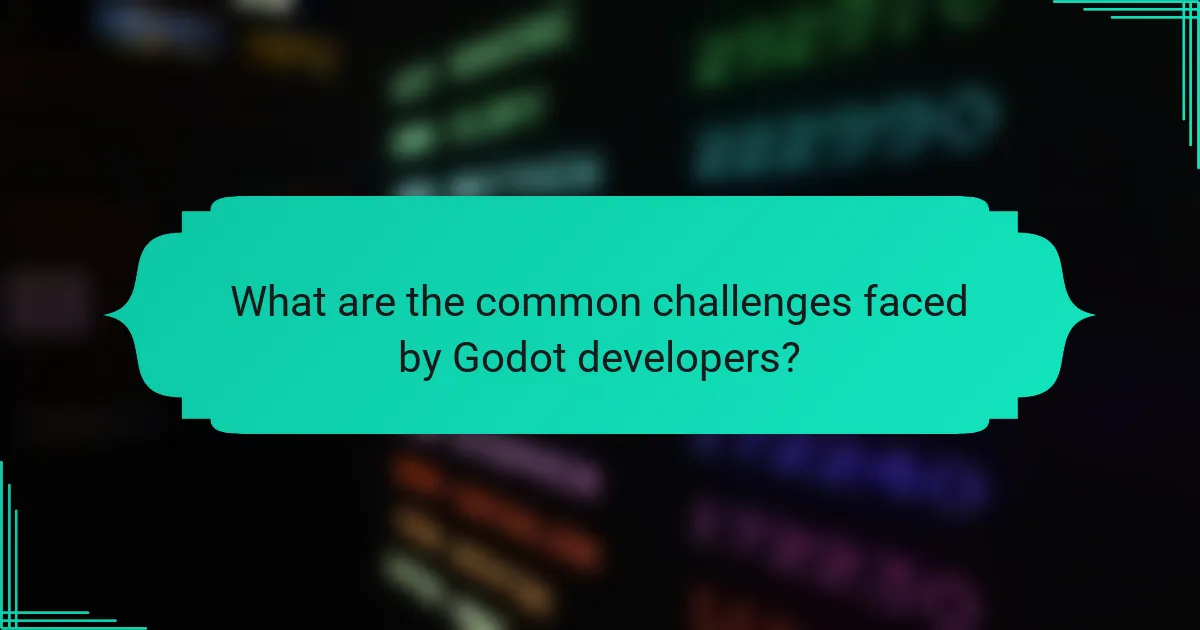
What are the common challenges faced by Godot developers?
Godot developers commonly face challenges such as limited documentation, performance optimization, and community support. These issues can hinder development efficiency and project success.
Limited documentation often results in difficulties finding specific solutions or understanding advanced features. Performance optimization is crucial, especially for complex games, as inefficient code can lead to lag and poor user experience. Community support can vary, with some developers struggling to find timely assistance or resources for troubleshooting.
Additionally, compatibility with third-party assets can pose challenges, as not all assets are optimized for Godot. Developers may also encounter a steep learning curve when transitioning from other game engines.
How can users troubleshoot issues in Godot?
Users can troubleshoot issues in Godot by following systematic steps. First, check the output console for error messages that indicate specific problems. Next, consult the official documentation for guidance on common issues and solutions. Engaging with the Godot community through forums or Discord can provide additional support and insights. Lastly, consider updating to the latest version of Godot, as updates often fix bugs and improve performance.
What limitations should developers be aware of when using Godot?
Developers using Godot should be aware of limitations in performance, platform support, and advanced features. Godot may struggle with high-end graphics compared to engines like Unity or Unreal. Additionally, while it supports multiple platforms, some features may not be fully optimized across all devices. The documentation, though extensive, can sometimes lack depth for complex topics, requiring developers to rely on community forums for advanced troubleshooting. Finally, the engine’s unique scripting language, GDScript, may present a learning curve for those accustomed to other languages.
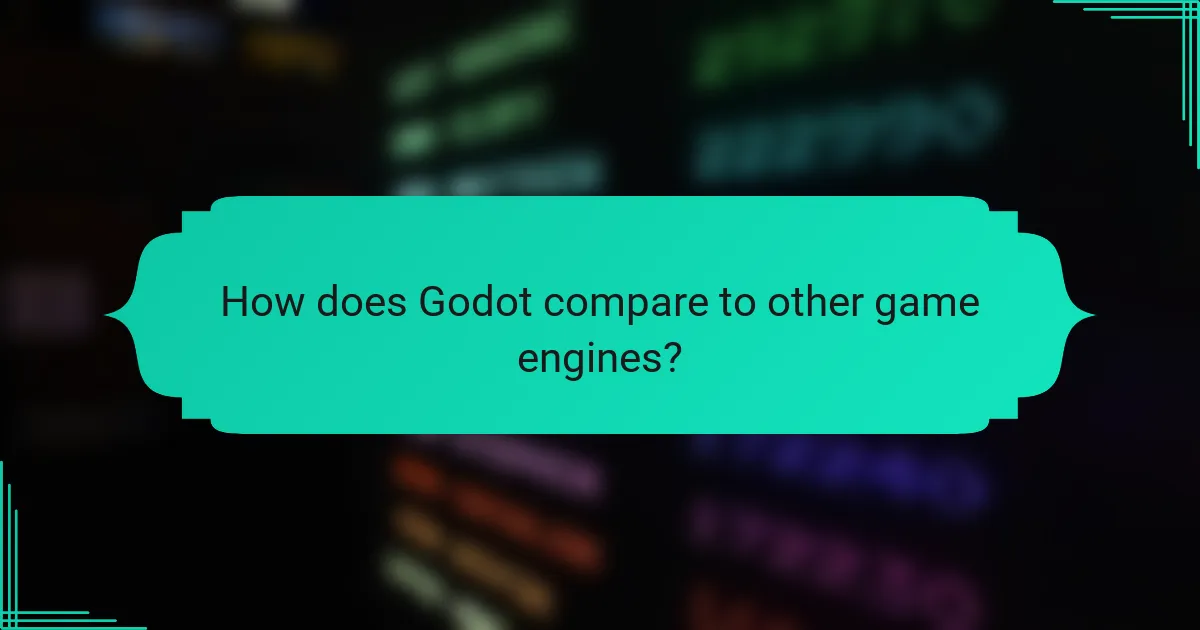
How does Godot compare to other game engines?
Godot offers unique advantages compared to other game engines, including a user-friendly interface and a strong community. Its open-source nature fosters collaborative development, while extensive documentation aids learning. Godot’s scripting language, GDScript, is designed for ease of use, differentiating it from engines like Unity or Unreal. Additionally, Godot supports 2D and 3D game development, making it versatile for various projects.
What are the advantages of using Godot over Unity or Unreal Engine?
Godot offers several advantages over Unity and Unreal Engine, including a lightweight design, a fully open-source nature, and a user-friendly scripting language. It requires less hardware power, making it accessible for indie developers. The community support is robust, with active forums and extensive documentation. Godot’s scene system allows for flexible game design, enabling rapid prototyping. Additionally, its integrated development environment simplifies the workflow, particularly for 2D game development.
Which unique features set Godot apart from its competitors?
Godot stands out due to its open-source nature, flexible scene system, and strong community support. Unique features include a user-friendly scripting language, visual editor, and cross-platform deployment capabilities. Additionally, Godot’s lightweight footprint and customizable tools enhance development efficiency.
What are the considerations for choosing Godot based on project type?
Choosing Godot depends on your project type, as it excels in 2D and 3D game development. For 2D projects, Godot offers a robust set of features, including a dedicated scene system and flexible animation tools. In contrast, for 3D projects, its capabilities are improving but may not match engines like Unity or Unreal in advanced graphics. Consider community support and available learning resources, which are strong for both types. The engine’s open-source nature allows customization, making it suitable for indie developers and small teams.
How does Godot’s licensing affect its use in commercial projects?
Godot’s licensing allows unrestricted use in commercial projects, fostering innovation and accessibility. The MIT license enables developers to modify, distribute, and monetize their games without royalties or fees. This flexibility encourages a diverse range of projects, from indie games to larger commercial ventures. Additionally, the supportive community contributes resources and tools that enhance development, making Godot an appealing choice for commercial game development.
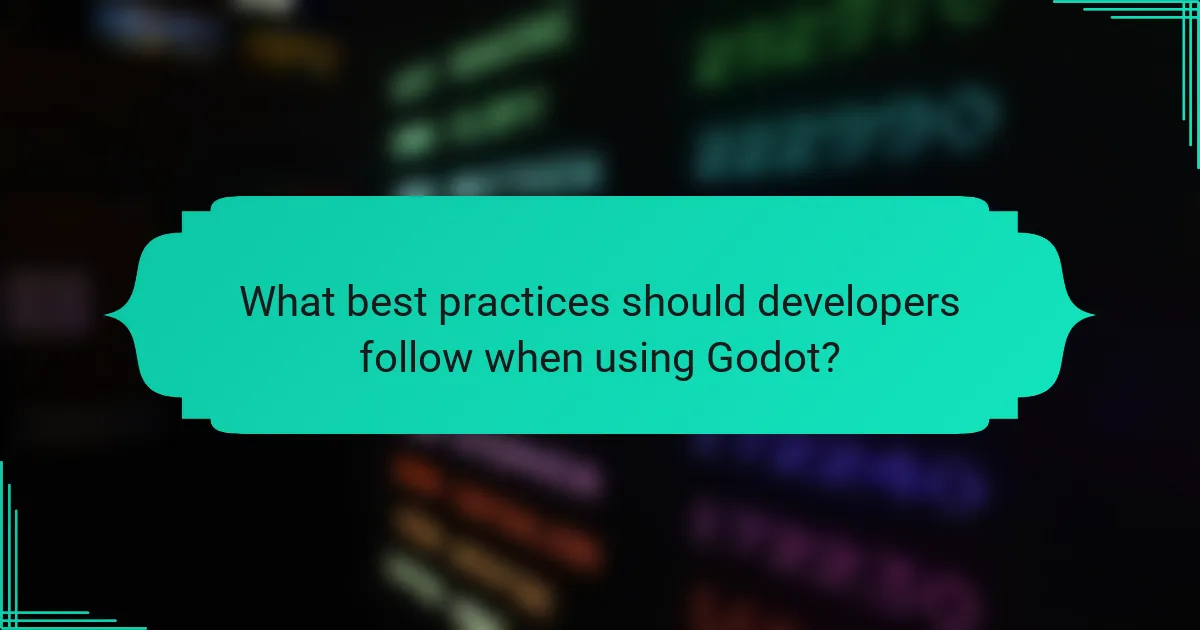
What best practices should developers follow when using Godot?
Developers using Godot should follow best practices to enhance their game development process. Key practices include utilizing the scene system effectively, leveraging GDScript for scripting, and engaging with the community for support and resources.
1. Organize scenes hierarchically to manage complex projects easily.
2. Write modular code in GDScript to promote reusability and maintainability.
3. Take advantage of Godot’s built-in debugging tools to identify issues early.
4. Regularly check for updates and participate in community forums for the latest tips and tricks.
These practices help streamline development and improve overall project quality.
How can developers optimize performance in Godot games?
Developers can optimize performance in Godot games by utilizing built-in profiling tools, optimizing resource management, and employing efficient coding practices. Profiling tools help identify bottlenecks, allowing developers to focus on critical areas. Resource management, including texture atlases and scene instancing, reduces overhead. Efficient coding practices, such as avoiding unnecessary calculations in the game loop, enhance overall performance.
What common mistakes should be avoided in Godot development?
Avoiding common mistakes in Godot development is crucial for creating successful games. Key errors include neglecting to optimize performance, underestimating the importance of user feedback, and failing to utilize community resources effectively.
1. Ignoring performance optimization can lead to laggy gameplay.
2. Overlooking user feedback may result in a game that does not meet player expectations.
3. Not engaging with community forums limits access to valuable insights and solutions.
4. Skipping version control can cause loss of progress and complicate collaboration.
5. Underutilizing Godot’s built-in features can hinder game development efficiency.
Which strategies enhance collaboration in Godot projects?
Effective strategies to enhance collaboration in Godot projects include utilizing version control systems, organizing regular team meetings, and establishing clear communication channels. Version control systems, such as Git, help manage changes and track contributions from multiple developers. Regular meetings foster alignment on project goals and progress updates. Clear communication channels, like Discord or Slack, facilitate quick discussions and feedback, ensuring that all team members are on the same page.
